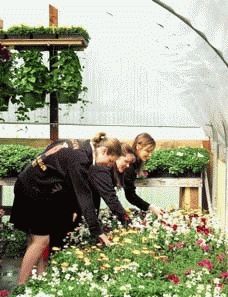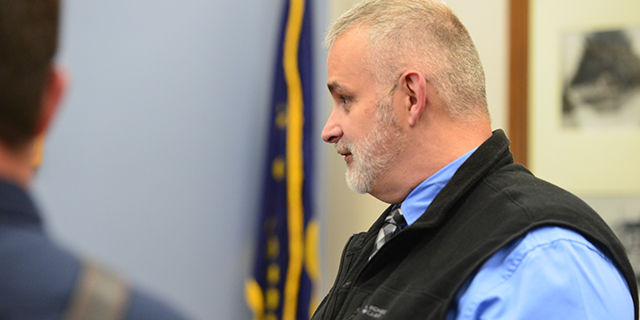NEW GREENHOUSE AT IMBLER HIGH SCHOOL HAS STYLE AND SUBSTANCE
Published 12:00 am Monday, April 24, 2006

- THE PAYOFF: Every fragrant flower, every tasty herb thriving in the Imbler FFA greenhouse today has been diligently cared for by chapter members like greenhouse manager Emily Lamp, chapter treasurer Nicole Crow and chapter vice president Kelli Jo McKee. (Story and photos by Mardi Ford).
IMBLER
Trending
J.D. Cant, ag sciences teacher and FFA chapter adviser for the past four years, remembers when the old greenhouse was built in 1996. He was a student and a member of Imbler’s FFA chapter.
Today the old greenhouse is an indoor garden of hanging baskets, single-pot perennials, packs of annuals and row after row of healthy-looking herbs and vegetables. And unless you’ve already seen its neighbor, the old greenhouse looks no worse, no better than any other school greenhouse.
"My students named it the ghetto," Cant laughs good-naturedly as he closes the door. "We’ll continue to use it, too. Actually, everything that’s in both greenhouses was crammed in here until just a couple months ago."
Trending
A few steps from the old greenhouse stands the new one.
"We began building this in October, I think, and finished around February," Cant says.
The new greenhouse was made possible, he adds, thanks to an incalculable number of hours of labor by the 90 or so FFA members and innumerable contributions from local folks and others. Cant says there are so many people to thank, he’s afraid of listing them for fear of leaving someone out.
"I do want to say we have a lot of help from about eight special ladies who love to garden and come here every day to help us," he says.
Inside the new greenhouse the feeling is light and open, with a delightful feast of color everywhere you look. A stylish counter and new state-of-the-art cash register has propelled a just-another-school-project to a whole new level, the rival of many a commercial greenhouse operation.
Cant is very aware of the fact that greenhouse and nursery products are the fastest growing commodity in Oregon’s more than $4 billion agriculture industry. In 2004, it ranked No. 1 with more than $817 million in value.
"Cattle and calves rank second, but nursery is first. I’d be remiss in my job if I didn’t teach them this part of it, too," he says.
Besides, Cant admits he doesn’t like fundraisers. If the greenhouse is run like a business, they’re providing a service rather than asking for money.
And there are other lessons the kids learn from the greenhouse. He likens the commitment to a farmer putting all his product in the ground in the spring and waiting until fall to reap the benefit.
"You can’t fake it. If you don’t work at this every day, the plants in here will die. These kids have worked really hard at this. One example is the research we did to find just the right soil," he says.
The potting soil they use, and sell, has more coconut fiber to hold water longer, and contains a very slow release soil fertilizer up to four months. If the customers forget to feed their new plants, they should be OK for a while, Cant says.
The science of the greenhouse also includes knowing how to rotate the fertilizer, insecticides and watering because you can’t water when you spray. Students have also learned that indicator plants sweet potato vine and mini-petunias will tell them if a bug problem is on the rise, because "aphids love them."
Cant has nicknamed greenhouse manager Emily Lamp the "Consistent Factor" because, he says, "She has worked out here every day for at least one hour watering, checking for bugs or doing whatever needs to be done. She’s the first to know if we have a problem out here."
And there are a lot of plants under her care more than 13 varieties of 7,000 petunias alone, as well as other annuals, some perennial flowers, vegetables and herbs. In all, the plants represent a $6,000 total investment on top of the $10,000 investment in the new greenhouse, says Nicole Crow, chapter treasurer.
And the ambitious group hopes to retire every bit of that debt this year.
"If we sell everything we have in here right now, we will do it," says Cant.
In all, Cant estimates there are about 350 specialty baskets with mixtures of petunias, fuchsia, geraniums and more. Their baskets are their signature item. This year’s "Panther" baskets are a blend of orange and white flowers mixed with the black ace of spades variety of sweet potato vine.
"Every basket you see, some kid put it together. Either they saw it in a magazine or somewhere and thought let’s try this and that," Cant says.
But perhaps the most amazing thing about this stylish and locally grown and tended greenhouse is that everything inside was built on an industry foundation faith in a seed.
The Imbler FFA Greenhouse will be open for business May 8 through May 20, from 8:30 a.m. to 4 p.m. Monday through Friday and 9 a.m. to 4 p.m. Saturday and Sunday.









